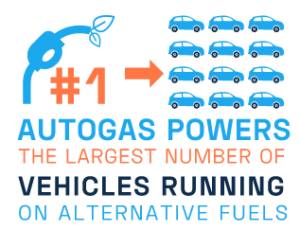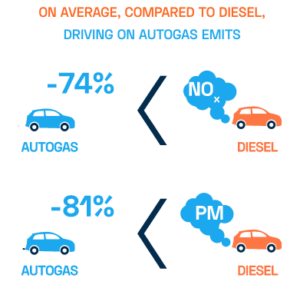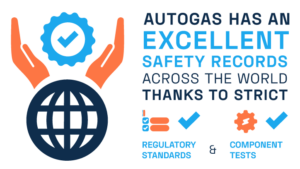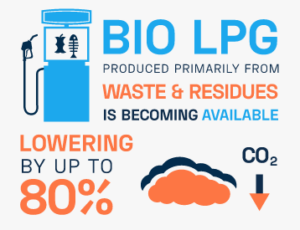‘Autogas – Tomorrow’s Fuel. Today’ by James Rockall, CEO & Managing Director, WLPGA
 Despite global turmoil from the Covid-19 pandemic and war in Europe, rarely a day passes without commentators, media and policy makers reminding us of the twin challenges coming from the threat of climate change and poor air quality from the use of polluting fuels. Indeed, in many respects the latter poses the most immediate threat to human health, with an estimated 4.2 million premature deaths a year due to air pollution. In addressing these challenges, road transport is a clear and obvious target, with over a billion vehicles on the road, contributing to some 75% of the overall greenhouse gas emissions from transport, which itself is the largest contributor to global climate change. Compounding the challenge is that most of the vehicles on the road today have a lifespan of more than 15 years and represent a large proportion of personal capital, making the prospect of a fast replacement with alternative vehicles quite remote. Fortunately, we have Autogas.
Despite global turmoil from the Covid-19 pandemic and war in Europe, rarely a day passes without commentators, media and policy makers reminding us of the twin challenges coming from the threat of climate change and poor air quality from the use of polluting fuels. Indeed, in many respects the latter poses the most immediate threat to human health, with an estimated 4.2 million premature deaths a year due to air pollution. In addressing these challenges, road transport is a clear and obvious target, with over a billion vehicles on the road, contributing to some 75% of the overall greenhouse gas emissions from transport, which itself is the largest contributor to global climate change. Compounding the challenge is that most of the vehicles on the road today have a lifespan of more than 15 years and represent a large proportion of personal capital, making the prospect of a fast replacement with alternative vehicles quite remote. Fortunately, we have Autogas.
Transported and stored as a liquid, but consumed as a gas, Autogas, which is LPG for transport, can deliver cleaner, lower emission road transport than many alternatives currently available. Autogas is a viable, clean, available, and sustainable alternative transport fuel and out-performs petrol and especially diesel, as well as some other alternative fuels in the majority of studies comparing environmental performance that have been conducted around the world. With 97% of cities in the world with over 100,000 inhabitants in low and middle-income countries currently failing to meet the World Health Organisation air quality guidelines, Autogas vehicles, which show up to 20% lower emissions that petrol, 74% lower NOx emissions than diesel and only 20% of small particulate emissions compared to traditional fuels, can significantly improve air quality where NOx and PM emissions are negatively affecting human health.
As well as offering climate change and air quality benefits, a successful alternative fuel needs to be available, acceptable and affordable, and in these respects, Autogas ticks all the boxes. LPG is already the most commonly used unblended alternative fuel in the world, and an increasing number of countries promote its use, leading to an increase in consumption of more than 40% in the last ten years. Despite the growing popularity of electric vehicles, sales of Autogas vehicles exceeded those of electric vehicles in 2020. Safety is a key criterion when selecting a vehicle and here Autogas has a good record. With fuel tanks that are 20 times more puncture resistant and can withstand far more pressure than typical petrol tanks, an Autogas vehicle is a safe choice.
Every country in the world already consumes LPG in a wide range of applications. This enables the fast and low-cost installation of LPG refuelling facilities anywhere in a country, from urban areas to rural settings. A major consideration in selecting a vehicle is purchase price and cost of operations. Given that many of the vehicles currently on the road have a remaining life of over 15 years, the great cost advantage of Autogas is that the existing vehicle can be converted at relatively low cost. Despite this advantage, demand remains highly concentrated in a small number of markets: the five largest countries – Türkiye, Russia, Korea, Poland and Ukraine – together account for just under half of world consumption, while the top ten account for nearly 75%. These successful markets provide fiscal incentives – a necessary step to ensure that not only capital costs associated with Autogas are low, but also long-term operating costs are also low. The success of these markets also shows that with simple policy measures, Autogas can rapidly grow in any country, quickly becoming a major element of the clean-transport mix.
As many countries in the world pursue deep decarbonisation targets, there is a growing move towards lower, and ultimately zero-emissions road transport. The pathway to achieving these targets for Autogas-fuelled vehicles is becoming clearer as near-zero renewable LPG (rLPG) is being developed. Suitable as a drop-in fuel into existing Autogas vehicles, the promise of rLPG provides a future-proof solution for vehicle owners, fuel infrastructure operators and governments.
Our world is becoming increasingly low-carbon and all sectors of the economy need to address emissions. In the road transport sector Autogas should be the fuel of choice for many countries. Why? Because, with its low emissions, low cost and ease of converting the existing vehicles, Autogas is the ideal fuel for quickly improving the air quality in cities and the overall level of greenhouse gas emissions in a country. There are no technology barriers to overcome with Autogas vehicles and LPG is widely used across the world. Autogas is already the low-carbon, low-emissions fuel of today, and with the advent of renewable LPG, low-cost deep decarbonisation can ensure that Autogas is also the road transport fuel of tomorrow.
James Rockall, CEO & Managing Director, WLPGA
About Autogas
Autogas, LPG as a transport fuel, is the most common unblended alternative vehicle fuel used in the world today. Driving an Autogas vehicle is safe, easy and in many countries, considerably cheaper than driving a petrol or diesel model. Autogas also emits less CO2 and pollutant emissions such as NOx. For full information on Autogas please visit: https://bit.ly/About_Autogas



